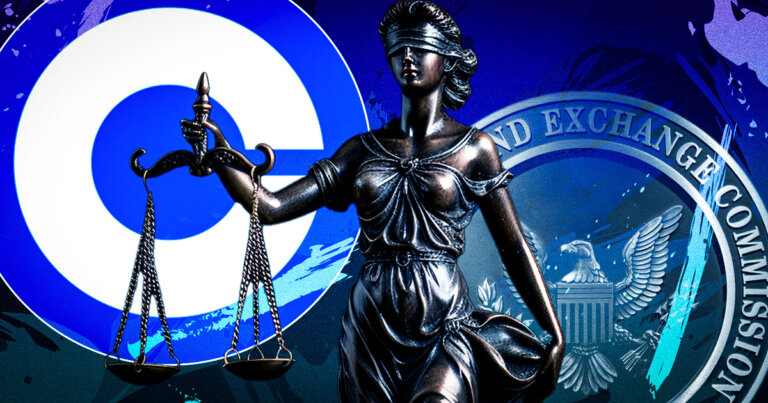 Judge in Coinbase case says SEC’s securities definition may be too broad
Judge in Coinbase case says SEC’s securities definition may be too broad Judge in Coinbase case says SEC’s securities definition may be too broad
The judge nevertheless declined to rule on or dismiss the case today.

Cover art/illustration via CryptoSlate. Image includes combined content which may include AI-generated content.
A court hearing between Coinbase and the U.S. Securities and Exchange Commission (SEC) took place on Jan. 17 concerning earlier charges.
In June 2023, the SEC alleged that Coinbase illegally operated a unregistered national securities exchange, broker, and clearing agency and that its crypto staking service involved the unregistered sale and offering of securities.
Though Judge Katherine Polk Failla did not provide a ruling or judgment today, she expressed concerns in line with those of Coinbase.
According to Reuters, Judge Failla commented on 13 crypto tokens that Coinbase provides customers with access to but does not issue, and which the SEC considers securities. The judge questioned the SEC’s arguments, stating:
“I am concerned… that what you’re asking for is to broaden the definition of what constitutes a security.”
The SEC’s assistant chief litigation counsel, Patrick Costello, instead argued that the crypto tokens in question are part of a larger enterprise (ie. blockchain network) and are therefore akin to investment contracts. He added that the value of each token increases as the value of the network or ecosystem grows. By extension, each asset could be considered a security as the case develops.
According to The Block, Costello conceded that token issuers had “not exactly” violated securities laws. The companies behind Cardano (ADA), Solana (ADA), and Polygon (MATIC) have previously denied those assets’ securities status and are not named as defendants the SEC’s case against Coinbase.
Hearing also addressed dismissal
FOX Business reporter Eleanor Terrett also reported on the hearing. According to Terrett’s account, Judge Failla asked the SEC why she should not dismiss the case, a course of action requested by Coinbase itself.
The judge cited Senator Cynthia Lummis’ support for a dismissal, calling Lummis “not just a random Senator” but “deeply involved in the space.” The judge paraphrased an earlier statement in which Lummis implied the outdatedness of securities tests, stating: “We’ve had a good run. We’ve had 90 years where these securities laws have been able to apply to these markets.”
Terrett went on to describe closing arguments. The SEC argued that Coinbase is misapplying the Howey Test of 1934 and denied any “easy workaround.”
Coinbase responded that the SEC has not shown that token issuers have done anything that could be considered a contract with Coinbase customers, stating:
“The Commission’s complaint draws the court into completely unprecedented territory. The SEC should follow enforcement and rulemaking actions that make sense of statutory language and [don’t] twist it upside down. This is several bridges too far and for that reason we ask you to dismiss [the SEC’s case] completely.”
Despite her critical attitude toward the SEC, Judge Failla declined to rule today, according to Terrett. The judge told both sides to take the lack of a decision as a “compliment,” suggesting that each side has a viable argument.





 Deribit
Deribit 














































































